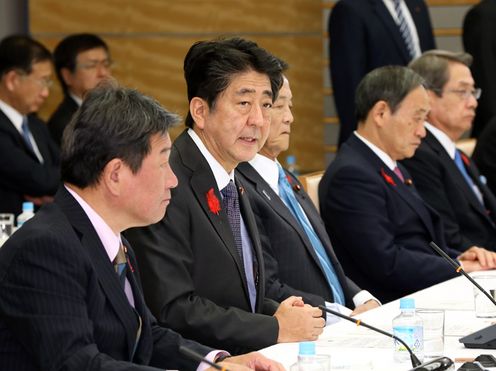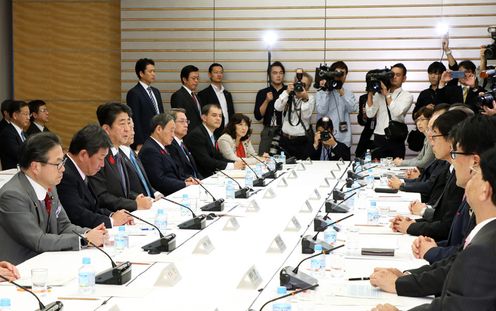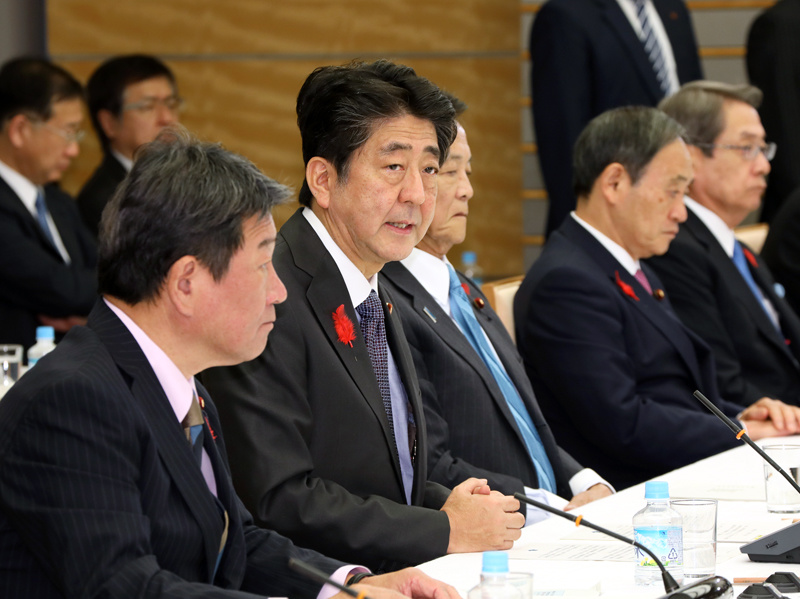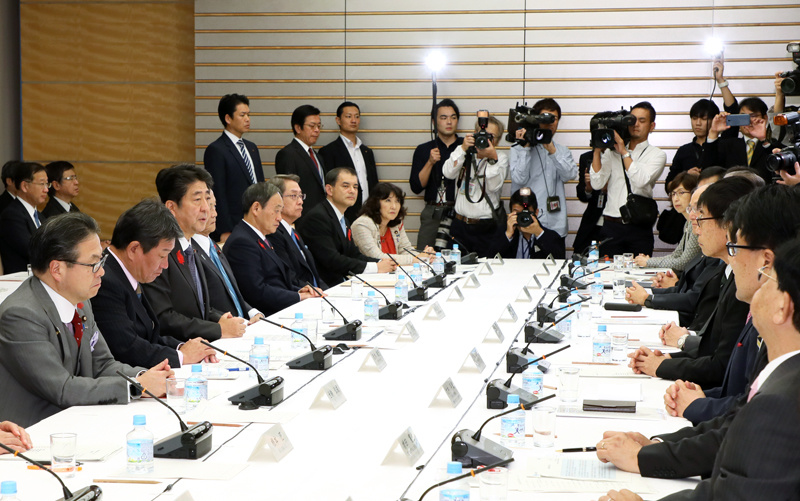Home > News > The Prime Minister in Action > October 2018 > Council on Investments for the Future
The Prime Minister in Action
Council on Investments for the Future
October 5, 2018

Photograph of the Prime Minister making a statement (1)

Photograph of the Prime Minister making a statement (2)
[Provisional Translation]
On October 5, 2018, Prime Minister Shinzo Abe held the 19th meeting of the Council on Investments for the Future at the Prime Minister’s Office.
At the meeting, a discussion was held on the Direction of the Growth Strategy (Draft).
Based on the discussion, the Prime Minister said,
“On a rather personal note, I recently got another three-year term as President of the Liberal Democratic Party. While listening to various comments today, I renewed my commitment to exert every effort to promote various reforms, sharing these views with my colleagues. Against this backdrop, we have started discussions on various reform agendas over the next three years, by kicking off the Council on Investments for the Future under the new Cabinet. At today’s first meeting, we held discussions on our future strategy.
The first item is achieving ‘Society 5.0.’ Regarding the Fourth Industrial Revolution, the world is transforming at an accelerated pace. Now that the employment situation is improving even further, it will be a great opportunity to increase labor productivity by proactively introducing technological innovations to workplaces. The next three years will be critical. We will also review financial legislation and consider further collaboration with financial institutions to crystalize a society in which anyone can make payments, transfer money, and receive services anywhere without cash.
In the area of mobility, we will carry out institutional reforms with a view to achieving a society in which, even in rural areas where the population is declining, the elderly can freely go to places and, even in overpopulated cities, people can go from one place to another without wasting waiting time.
With regard to public services, we will create systems for the automation of administrative procedures, such as those related to childrearing, change of address, death, and inheritance. Furthermore, we will simultaneously transition to maintenance methods that utilize artificial intelligence (AI), robots, and sensors for infrastructure such as roads and water services, taking into account the perspective of disaster risk reduction.
Then comes the reform of the social security system for all generations, which is the greatest challenge for the Abe Cabinet. The Council on Investments for the Future will hold intensive discussions regarding this matter.
To realize a society where people play active roles throughout their lives, we will commence reviews to raise the age limit for continuous employment to over 65 so as to create workplaces for the elderly who are motivated to work. In this process, we will take into account the provision of diverse job opportunities tailored to the circumstances of each individual.
We will also commence reviews for reforming the employment system, including revising traditional recruiting practices to periodically hire new college graduates, expanding mid-career recruitments, and facilitating job changes.
In the area of health and medicine, we will take steps to prevent diabetes, frailty of the elderly, and dementia, as well as strengthen the incentive measures of local governments and others for insurers in order to narrow the gap between one’s lifespan and the lifespan during which one is healthy for a healthy 100-year life as much as possible.
Furthermore, we will enhance policy measures aimed at the regions. Amidst the increasing difficulties in securing essential services in some of the regions due to decreasing populations, we will review the current practice of applying the Antimonopoly Act with an eye to integration and consolidation, as well as increasing the productivity of local foundational companies, such as local banks.
In order to pass beautiful hometowns with traditions onto the next generation, we will strengthen our supports for regions, which are experiencing rapidly declining populations, and continue to help increase the productivity of micro, small and medium-sized enterprises that support local economies.
We will compile an interim report by the end of this year. On top of that, we will compile an action plan with three three-year roadmaps and approve it in a Cabinet meeting by next summer so as to eliminate bottlenecks to these reforms.
I will take the lead and I would like to ask all the relevant Ministers in the Abe Cabinet, including Minister Motegi, who is in charge of economic revitalization and social security reform, to proceed due considerations in a concrete manner, like a metaphorical baseball team where everyone up and down “the roster” does whatever they can, without limiting themselves to the “infield” or “outfield.”
On October 5, 2018, Prime Minister Shinzo Abe held the 19th meeting of the Council on Investments for the Future at the Prime Minister’s Office.
At the meeting, a discussion was held on the Direction of the Growth Strategy (Draft).
Based on the discussion, the Prime Minister said,
“On a rather personal note, I recently got another three-year term as President of the Liberal Democratic Party. While listening to various comments today, I renewed my commitment to exert every effort to promote various reforms, sharing these views with my colleagues. Against this backdrop, we have started discussions on various reform agendas over the next three years, by kicking off the Council on Investments for the Future under the new Cabinet. At today’s first meeting, we held discussions on our future strategy.
The first item is achieving ‘Society 5.0.’ Regarding the Fourth Industrial Revolution, the world is transforming at an accelerated pace. Now that the employment situation is improving even further, it will be a great opportunity to increase labor productivity by proactively introducing technological innovations to workplaces. The next three years will be critical. We will also review financial legislation and consider further collaboration with financial institutions to crystalize a society in which anyone can make payments, transfer money, and receive services anywhere without cash.
In the area of mobility, we will carry out institutional reforms with a view to achieving a society in which, even in rural areas where the population is declining, the elderly can freely go to places and, even in overpopulated cities, people can go from one place to another without wasting waiting time.
With regard to public services, we will create systems for the automation of administrative procedures, such as those related to childrearing, change of address, death, and inheritance. Furthermore, we will simultaneously transition to maintenance methods that utilize artificial intelligence (AI), robots, and sensors for infrastructure such as roads and water services, taking into account the perspective of disaster risk reduction.
Then comes the reform of the social security system for all generations, which is the greatest challenge for the Abe Cabinet. The Council on Investments for the Future will hold intensive discussions regarding this matter.
To realize a society where people play active roles throughout their lives, we will commence reviews to raise the age limit for continuous employment to over 65 so as to create workplaces for the elderly who are motivated to work. In this process, we will take into account the provision of diverse job opportunities tailored to the circumstances of each individual.
We will also commence reviews for reforming the employment system, including revising traditional recruiting practices to periodically hire new college graduates, expanding mid-career recruitments, and facilitating job changes.
In the area of health and medicine, we will take steps to prevent diabetes, frailty of the elderly, and dementia, as well as strengthen the incentive measures of local governments and others for insurers in order to narrow the gap between one’s lifespan and the lifespan during which one is healthy for a healthy 100-year life as much as possible.
Furthermore, we will enhance policy measures aimed at the regions. Amidst the increasing difficulties in securing essential services in some of the regions due to decreasing populations, we will review the current practice of applying the Antimonopoly Act with an eye to integration and consolidation, as well as increasing the productivity of local foundational companies, such as local banks.
In order to pass beautiful hometowns with traditions onto the next generation, we will strengthen our supports for regions, which are experiencing rapidly declining populations, and continue to help increase the productivity of micro, small and medium-sized enterprises that support local economies.
We will compile an interim report by the end of this year. On top of that, we will compile an action plan with three three-year roadmaps and approve it in a Cabinet meeting by next summer so as to eliminate bottlenecks to these reforms.
I will take the lead and I would like to ask all the relevant Ministers in the Abe Cabinet, including Minister Motegi, who is in charge of economic revitalization and social security reform, to proceed due considerations in a concrete manner, like a metaphorical baseball team where everyone up and down “the roster” does whatever they can, without limiting themselves to the “infield” or “outfield.”


